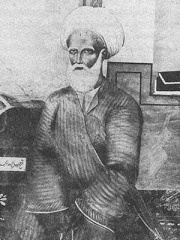RELIGIOUS FIGURE
'Abd Allah ibn Rawahah

 'Abd Allah ibn Rawahah
'Abd Allah ibn Rawahah
Abd Allah ibn Rawahah ibn Tha'laba (Arabic: عَبْد ٱللَّٰه ٱبْن رَوَاحَة ٱبْن ثَعْلَبَة, romanized: ʿAbd Allāh ibn Rawāḥa ibn Thaʿlaba), was one of the companions of the Islamic prophet Muhammad who was killed in the Battle of Mut'ah. Read more on Wikipedia
His biography is available in 27 different languages on Wikipedia (up from 25 in 2024). 'Abd Allah ibn Rawahah is the 1,462nd most popular religious figure (down from 1,229th in 2024), the 160th most popular biography from Saudi Arabia (up from 162nd in 2019) and the 68th most popular Saudi Arabian Religious Figure.
Memorability Metrics
Page views of 'Abd Allah ibn Rawahah by language
Among RELIGIOUS FIGURES
Among religious figures, 'Abd Allah ibn Rawahah ranks 1,462 out of 3,187. Before him are Cyril Lucaris, Ahijah the Shilonite, Marcello Semeraro, Pavle, Serbian Patriarch, Franjo Šeper, and Paschal Baylón. After him are Angelo Bagnasco, Hugh I, Duke of Burgundy, Maximus V of Constantinople, Antipope Theodore, Menas of Constantinople, and Gianfranco Ravasi.
Most Popular Religious Figures in Wikipedia
Go to all RankingsCyril Lucaris
1572 - 1638
HPI: 63.62
Rank: 1,456
Ahijah the Shilonite
HPI: 63.61
Rank: 1,457
Marcello Semeraro
1947 - Present
HPI: 63.60
Rank: 1,458
Pavle, Serbian Patriarch
1914 - 2009
HPI: 63.59
Rank: 1,459
Franjo Šeper
1905 - 1981
HPI: 63.59
Rank: 1,460
Paschal Baylón
1540 - 1592
HPI: 63.59
Rank: 1,461
'Abd Allah ibn Rawahah
HPI: 63.58
Rank: 1,462
Angelo Bagnasco
1943 - Present
HPI: 63.58
Rank: 1,463
Hugh I, Duke of Burgundy
1057 - 1093
HPI: 63.58
Rank: 1,464
Maximus V of Constantinople
1897 - 1972
HPI: 63.55
Rank: 1,465
Antipope Theodore
687 - 699
HPI: 63.55
Rank: 1,466
Menas of Constantinople
HPI: 63.54
Rank: 1,467
Gianfranco Ravasi
1942 - Present
HPI: 63.53
Rank: 1,468
In Saudi Arabia
Among people born in Saudi Arabia, 'Abd Allah ibn Rawahah ranks 160 out of 354. Before him are Suhayl ibn Amr (556), Umayya ibn Khalaf (null), Ibn Shihab az-Zuhri (678), Yazid ibn Abi Sufyan (null), Muslim ibn Aqil (650), and Umayya ibn Abd Shams (null). After him are Nimr al-Nimr (1959), Sultan bin Salman Al Saud (1956), Abdul Rahman Al-Sudais (1960), Ahmed Zaki Yamani (1930), Jotapianus (200), and Muhammad al-Nafs al-Zakiyya (690).
Others born in Saudi Arabia
Go to all RankingsSuhayl ibn Amr
POLITICIAN
556 - 639
HPI: 63.99
Rank: 154
Umayya ibn Khalaf
RELIGIOUS FIGURE
HPI: 63.96
Rank: 155
Ibn Shihab az-Zuhri
RELIGIOUS FIGURE
678 - Present
HPI: 63.94
Rank: 156
Yazid ibn Abi Sufyan
MILITARY PERSONNEL
HPI: 63.82
Rank: 157
Muslim ibn Aqil
RELIGIOUS FIGURE
650 - 680
HPI: 63.81
Rank: 158
Umayya ibn Abd Shams
POLITICIAN
HPI: 63.64
Rank: 159
'Abd Allah ibn Rawahah
RELIGIOUS FIGURE
HPI: 63.58
Rank: 160
Nimr al-Nimr
SOCIAL ACTIVIST
1959 - 2016
HPI: 63.51
Rank: 161
Sultan bin Salman Al Saud
POLITICIAN
1956 - Present
HPI: 63.45
Rank: 162
Abdul Rahman Al-Sudais
POLITICIAN
1960 - Present
HPI: 63.34
Rank: 163
Ahmed Zaki Yamani
POLITICIAN
1930 - 2021
HPI: 63.34
Rank: 164
Jotapianus
POLITICIAN
200 - 249
HPI: 63.31
Rank: 165
Muhammad al-Nafs al-Zakiyya
POLITICIAN
690 - 762
HPI: 63.30
Rank: 166
Among RELIGIOUS FIGURES In Saudi Arabia
Among religious figures born in Saudi Arabia, 'Abd Allah ibn Rawahah ranks 68. Before him are Abu Hudhayfa ibn Utba (581), Hudhayfah ibn al-Yaman (600), Abdul-Aziz ibn Abdullah Al ash-Sheikh (1943), Umayya ibn Khalaf (null), Ibn Shihab az-Zuhri (678), and Muslim ibn Aqil (650). After him are Fatimah bint Musa (790), Said ibn al-Musayyib (642), Muhammad ibn al-Uthaymeen (1925), Aqil ibn Abi Talib (590), Shaykh Ahmad (1753), and Asma bint Umais (null).
Abu Hudhayfa ibn Utba
581 - 633
HPI: 64.29
Rank: 62
Hudhayfah ibn al-Yaman
600 - 656
HPI: 64.18
Rank: 63
Abdul-Aziz ibn Abdullah Al ash-Sheikh
1943 - 2025
HPI: 64.12
Rank: 64
Umayya ibn Khalaf
HPI: 63.96
Rank: 65
Ibn Shihab az-Zuhri
678 - Present
HPI: 63.94
Rank: 66
Muslim ibn Aqil
650 - 680
HPI: 63.81
Rank: 67
'Abd Allah ibn Rawahah
HPI: 63.58
Rank: 68
Fatimah bint Musa
790 - 816
HPI: 63.28
Rank: 69
Said ibn al-Musayyib
642 - 715
HPI: 63.24
Rank: 70
Muhammad ibn al-Uthaymeen
1925 - 2001
HPI: 63.16
Rank: 71
Aqil ibn Abi Talib
590 - 670
HPI: 63.02
Rank: 72
Shaykh Ahmad
1753 - 1826
HPI: 62.83
Rank: 73
Asma bint Umais
HPI: 62.21
Rank: 74

































